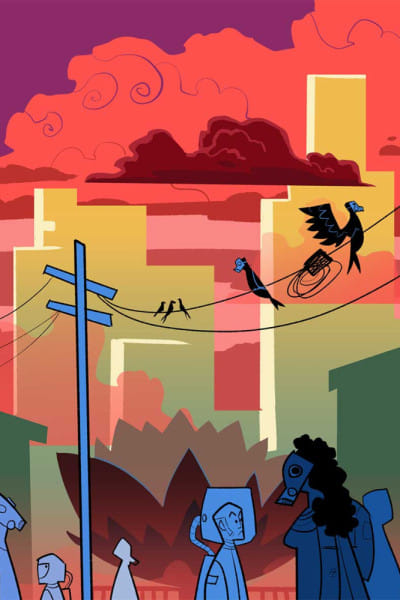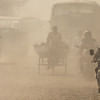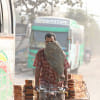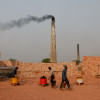Air pollution is an existential threat for us. We must act.

Every year, the Economist Intelligence Unit publishes a list of liveable cities in the world, where Dhaka is invariably placed near the bottom. Air pollution is one of the major reasons ruining Dhaka's prospect as a liveable city. It is also one of the issues we've struggled to deal with for a long time. So, what makes Dhaka's air so polluted?
According to the Department of Environment, brick kilns are responsible for 58 percent of Dhaka's air pollution. Another major source of pollution is dust from continuous road-digging as well as unplanned and uncoordinated construction works. Throughout the year, roads are dug in different parts of the city, which often remain in that state for extended periods of time. This is exacerbated by the many construction projects that are underway. Old, obsolete vehicles producing black fumes as well as heavy traffic jams across the city are equally responsible for its poor air quality. Indoor air pollution, particularly through the use of wood or coal stoves in slum areas, has also been identified as a health threat.
If we look at the bigger picture, we will understand that what's happening in Dhaka is not unique; other major cities and districts are also susceptible to the air pollution. According to the Centre for Atmospheric Pollution Study (CAPS), the highest level of pollution has been observed in Gazipur district, followed by Dhaka and Narayanganj. Only 10 districts across Bangladesh have good air quality, while 36 districts have moderate levels of air pollution and 18 districts have high levels of air pollution.
After CAPS analysed the US Embassy AirNow data from 2017 to 2021, it has been found that the average air pollution increased by 9.8 percent in 2021, compared to 2020. It has been also found that, in the last six years in Dhaka, residents got only 38 days of good air. For 510 days, they got moderate air, alongside 577 days of sensitive air (which is harmful for people with respiratory issues, children and pregnant women). During the same period, there were 443 days of unhealthy air, 385 days of very unhealthy air, and 37 days of extremely unhealthy or hazardous air.
On November 15, 2019, the High Court issued a directive asking the two city corporations of Dhaka to spray water over different roads twice a day and to cordon off construction sites. Again, on February 15, 2022, the HC directed the authorities concerned to identify and make a list of the main activities responsible for air pollution across the country. The HC also asked the authorities to prepare a time-bound mitigation plan to install Continuous Air Monitoring Stations (CAMS) in appropriate places, introduce a system to save people from exposure to unhealthy air, and also asked them to develop an action plan about switching to substitutes for baked bricks and to submit a report to the HC within four months. We don't know what the government did in response, but it surely wasn't enough to reduce air pollution.
We need to understand that to effectively control air pollution, everyone, from individuals to institutions, has to work together in an inclusive, scientific, and coordinated manner. The importance of awareness cannot be overestimated. We have entered an era when facemasks should be used not just for protection from the coronavirus, but from poor air as well. Babies, elderly people, sick people and pregnant women need to be especially careful.
Water-spraying in the streets at least twice a day, in the morning and the afternoon, should be a regular practice. The city corporations can also ask building owners to spray water on the streets in front of their respective buildings every day. In order to avoid wasting water, they could reuse the water expelled by air conditioners (AC) for this purpose. More than three lakh ACs are used in Dhaka city. An AC with the capacity of a ton produces at least three litres of water every two to three hours as a by-product.
Additionally, all construction sites should be fenced off and construction materials should be covered during transportation. Vehicles without fitness must be removed from the streets. Since traffic jam is a major source of air pollution, we must find innovative ways to control it and reduce the number of automobiles plying our streets. Also, air pollution forecasting should be introduced, and suction trucks can be used to collect dust from the roads.
In addition, construction works need to be better coordinated and better timed (for example, allowing work only at night in the busiest of areas). A service company may be allowed to dig as many roads at once as they can in two or three days. Moreover, advanced technologies have to be used in the brick kilns. As an alternative to baked bricks, the use of blocks can be gradually increased. And, the Clean Air Act 2019 must be enacted as soon as possible.
Among other things that we can do are: further developing the public transport system and limiting the use of private vehicles; developing a proper waste management system including using "incinerators" so that energy can be generated from waste; considering artificial rain in the dry season, especially where the air is particularly hazardous; ensuring the use of renewable fuels; ensuring proper management of electronic products and car batteries; and planting lots of trees across the city.
People should be encouraged to do roof-gardening. The annual budget allocation of the Ministry of Environment needs to be increased to create environmental awareness. An environmental officer has to be appointed in every upazila, and to ensure this, the position of an environmental cadre can be included in the Public Service Commission. Above all, arranging more information-based programmes on air pollution in various media can further raise public awareness of the issue as well as create pressure on the competent authorities to act properly.
If we make a serious effort to prevent air pollution, we can leave behind a liveable city for the next generation. This will of course increase people's average life expectancy, but more importantly, it will guarantee healthier living for us all.
Dr Ahmad Kamruzzaman Majumder is dean at the faculty of science, Stamford University Bangladesh, joint secretary at Bangladesh Poribesh Andolon (BAPA), and chairman at Center for Atmospheric Pollution Studies (CAPS).

 For all latest news, follow The Daily Star's Google News channel.
For all latest news, follow The Daily Star's Google News channel. 








Comments